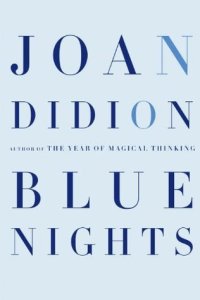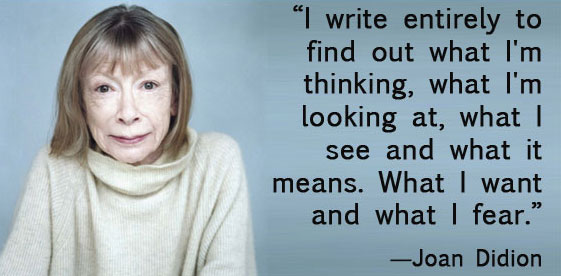This book is called “Blue Nights” because at the time I began it I found my mind turning increasingly to illness, to the end of promise, the dwindling of the days, the inevitability of fading, the dying of the brightness. Blue nights are the opposite of the dying of the brightness, but they are also its warning.
 Written as a reflection on the death of her daughter at 39 years of age, the book begins as Didion thinks back to her daughter’s wedding seven years earlier, which then triggers other memories of her childhood, of family moments, of people and places, numerous hotels they have frequented.
Written as a reflection on the death of her daughter at 39 years of age, the book begins as Didion thinks back to her daughter’s wedding seven years earlier, which then triggers other memories of her childhood, of family moments, of people and places, numerous hotels they have frequented.
She reflects on her role as a mother, something she hadn’t wanted to be, until suddenly she did, pregnancy had been something to fear, then it became something she yearned for, though it was not to be.
She had difficulty understanding her daughter’s fear of abandonment, knowing how much she needed her child. She displayed little if any understanding or knowledge of common issues that many adoptees often retain within their psyche, issues her daughter presented and was confronted by, including the later presentation of a fully formed family – her birth parents eventually married and had other children.
When we think about adopting a child, or for that matter about having a child at all, we stress the ‘blessing’ part.
We omit the instant of sudden chill, the ‘what if’ the free fall into certain failure.
What if I fail to take care of this baby?
What if this baby fails to thrive, what if this baby fails to love me?
And worse yet, worse by far, so much worse as to be unthinkable, except I did it, everyone who has ever waited to bring a baby home thinks it: what if I fail to love this baby?
Didion examines details of her daughters childhood and life and drawers of photographs and mementos of people who have left her. Not nearly as compelling at her year of magical thinking, and a little too much a collection of names dropped that I found myself skipping over, which all felt terribly sad.
When she speaks of herself, her prose is poetic, mellifluous, at ease. When writing snippets of motherhood and recalling images of her daughter, her language becomes stilted, dissonant, the connections between her thoughts less fluid, the pain too sharp. Ageing has been a long process, one she realises she has seen in her mother, grandmother, but won’t see in her daughter.
 Although the main theme of the book is her daughter’s premature death, nowhere does she analyse or obsess about what actually happened in the way we vividly remember she did about her husband in My Year of Magical Thinking. Rather, the book appears to be as much an acknowledgement of her own ageing and decline, recognising and facing up to her own ‘frailty’, her obsession with her own health scares, recounting every little malfunction or symptom of a thing that never shows up on any of the numerous scans or tests she has. It is as if she writes her own denouement, to a death that never arrives, as the multitude and thoroughness of all the tests she has show how very much alive and in relative good health she is, despite herself.
Although the main theme of the book is her daughter’s premature death, nowhere does she analyse or obsess about what actually happened in the way we vividly remember she did about her husband in My Year of Magical Thinking. Rather, the book appears to be as much an acknowledgement of her own ageing and decline, recognising and facing up to her own ‘frailty’, her obsession with her own health scares, recounting every little malfunction or symptom of a thing that never shows up on any of the numerous scans or tests she has. It is as if she writes her own denouement, to a death that never arrives, as the multitude and thoroughness of all the tests she has show how very much alive and in relative good health she is, despite herself.
I was curious to know what she might write looking back at this relationship with her only child, a precious adopted daughter and I was honestly quite shocked at how self-centred the entire book was and how little we came to know Quintana. Rather than go on about that, I refer anyone who is interested to this insightful article below.
Lorraine Dusky also gave birth in 1966 to a daughter, the same year Qunitana was born and for a while she actually thought Joan Didion may have adopted her daughter and went so far as to write and ask. It wasn’t the case and she later met her own daughter, who also died relatively young. As a birth mother she has significant awareness of the issues faced by birth parents and adoptees and her review and commentary of Blue Nights goes some way to addressing Didion’s oblivion.
Article – Joan Didion’s Blue Nights is Really an Adoption Memoir by Lorraine Dusky


As I work my way through processing my losses of this past year, I think I would do well to include something by Joan Didion. I have heard her speak so thoughtfully on the subject.
LikeLiked by 2 people
Perhaps not this one, Her Year of Magical Thinking is pretty a intense and extraordinary account of a grief that totally consumers her.
LikeLiked by 1 person
That article at First Mother Forum is stunning. Thank you for finding it, I feel I have learned something very important today.
LikeLiked by 1 person
Isn’t it, leave to a woman who has been speaking up on the subject for a very long time to give us an insightful perspective. I had to include it, it’s so honest and asks some interesting questions, while admitting how hard it can be for everyone concerned.
LikeLike
Yes, however did you come across it?
LikeLike
Actually, I saw it in the background when looking at photos, I picked one photo and that article came up, so it was a bit random really, but entirely riveting so decided to include it!
LikeLike
That’s the wonderful serendipity of the web!
LikeLiked by 1 person
I have this in my TBR so will save your review until I’ve read the book. It’s sure to be an emotional read.
LikeLiked by 1 person
Sadly, I was too stunned by it to feel any of the emotion of Her Magical Thinking. Definitely do not read my review yet!
LikeLike
Such an eloquent article, Claire. Thanks for tracking it down.
LikeLiked by 1 person
Thanks for reading it Susan, quite an eyeopener.
LikeLiked by 1 person
Very balanced review of a person that does not really address the issue at hand (daughter)….but rather used her book as a mirror to gaze at herself.
Did you get the impression that Didon was using the child as an ornament…
an embellishment of self? I’ve skimmed articles about Didon over the years and there lingered something I did not like. I never had a need to read her books…now I know I made the right choice.
LikeLike
I couldn’t really say what Didion was doing, only that it was such a contrast to how she treated the subject of her husband’s death, who clearly was the one great love of her life and then of course it’s complicated by the fact that her child was adopted, which is going to bring for many readers a less open minded acceptance of her treatment of the subject. She certainly presents a unique perspective, but this one was difficult for me to stomach, not so much because of what she did say, more perhaps the many things she didn’t.
LikeLiked by 1 person
Usually this would be way out of the comfort zone but you do spoil us with good reviews so I would love to pick this one up and give it a go.
LikeLiked by 1 person
Not her best work SteJ, to get a real flavour of her talent, I’d go for something much earlier.
LikeLiked by 1 person
Thanks for the tip, I shall add a few to my wishlist.
LikeLike
I really, really want to read anything by Joan Didion but all of her books scare me to death. I have only read praise for The Year of Magical Thinking, but the idea of losing a husband and a daugther seems unbearable to me. I thought about the obsession that usually accompanies death, and I’m glad to see you mention it here, because probably Blue Nights is a better place to start reading Didion. Thanks!
LikeLike
Pingback: You Don’t Look Adopted by Anne Heffron – Word by Word
Pingback: All You Can Ever Know by Nicole Chung – Word by Word